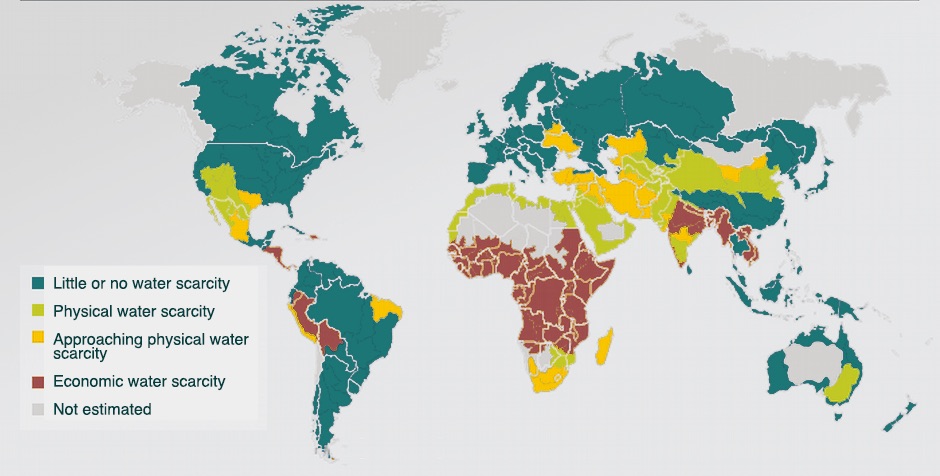Over 3,200 environmental specialists and 330 organizations from 130 countries have gathered in Sweden for World Water Week to exchange ideas, catalyze new thinking and develop solutions for today’s most pressing water challenges. With droughts in Somalia, water rationing in Rome, water-based conflicts in Donetsk and even flooding in Houston, time is of the essence.
Even though one billion trillion liters of water cover two-thirds of the world’s surface, 683 million people are left without direct access to this life-saving resource. If no action is taken, the majority of the global population will live in water-stressed regions by 2050.
The Driving Factors in Global Water Security
 Source: Edie (2017)
Source: Edie (2017)
.
Why are we at risk when there is so much water in the environment?
Firstly, our changing climate is drastically reducing the already minimal (1%) water available to sustain humankind’s demands for hydration, food and energy. Weather patterns and water cycles around the world are shifting, increasing the frequency and severity of droughts and floods. Extreme temperatures are increasing water stress in arid regions of the world and a climatic phenomenon called Hadley Cell Expansion is depriving sub-Saharan Africa, the Middle East and Central America of normal rainfall.
Water needs will only increase as the global population rises. There will be 2.3 billion more people in the world by 2050 and the United Nations have forecast that water demand will outstrip supply as early as 2030. The expected increase in global wealth will also exacerbate water security, as more money will be spent on water-intensive products such as meat and energy from fossil fuels. Daily water use per person in industrialized nations is closer to 140 liters. Much of this water also happens to be wasted, with 80% of the world’s wastewater discharged back into nature without further treatment or reuse.
One of the major factors responsible for excessive water consumption is conventional agriculture. 70% of all extracted water goes into irrigation and livestock feeding, leaving rivers, lakes and underground water sources around the world dry. Loss of vegetation from deforestation, overgrazing and urbanization is limiting our natural resources and the benefits that they provide. This is made worse by the fact that over half of total food production currently resides in areas of high or extreme water stress.
Water Scarcity Around the World
 Source: Deutsche Welle (2017)
Source: Deutsche Welle (2017)
Agriculture, therefore, has an obligation to strategically adapt its water management practices, not only for the health and survival of our populations but also for the protection of our environment. Reforestation with drought resistant trees and the use of annual cover crops, especially in arid regions of the world, reduce soil erosion while strengthening the health and fertility of topsoil. Modern, leak proof and intelligent irrigation systems save 60% of the water lost from outdated infrastructures. The use of natural, organic and biodegradable pesticides and fertilizers greatly reduces water pollution caused by their synthetic counterparts. These practices will inevitably help strengthen global water security and promote a much cleaner water cycle.
A new era of sustainable water use is already taking place with the rise of bio crop care, innovative irrigation techniques and safe resource management in agriculture. We at Unique continue to take water management very seriously by adopting responsible practices on our agricultural projects through the implementation of eco-dams, renewable energy infrastructure and environmentally responsible crop care solutions. Healthy ecosystems are vital to ensuring access to safe and plentiful water around the world. Planting new trees filters pollutants, buffers against floods and regulates water cycles, all of which are essential for strengthening the global water supply.